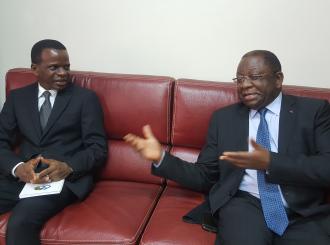
Yaounde, 12 March 2019 (ECA) – Cameroon needs the markets that the African Continental Free Trade Area (AfCFTA) will create to achieve its goal of becoming an upper middle-income state, the country’s Minister of Trade – Mr. Luc Magloire Mbarga Atanaga, has noted.
He was speaking while receiving in audience, a team from the UN Economic Commission for Africa (ECA) and the Economic Community of Central African States (ECCAS) to discuss crucial next steps for implementing the African Continental Free Trade Area (AfCFTA).
“The actions you plan to do in Cameroon are timely and very relevant for our own policy objectives” said the Minister, who expressed gratitude to the Director of ECA’s Subregional Office for Central Africa, Mr. Antonio Pedro, and trade experts from ECCAS, Messrs. Emmanuel Mbarga and Desiré Loumou, for leading an initiative that will culminate in a national sensitization and information forum on the AfCFTA for Cameroon in mid-April 2019 as well as the formulation of Cameroon’s National AfCFTA Strategy.
The forum will bring together Cameroonian government authorities and senior officials, leading private sector representatives and CSOs to analyse the opportunities and challenges of the AfCFTA and take the necessary steps to operationalize its instruments, to make it work for Cameroon.
That is the reason why ECA, through its subregional office for Central Africa, wants to accompany Cameroon in creating a fit-for-purpose national strategy on the AfCFTA.
“Such a strategy would have to be aligned with the broader development blueprints of the country and should contribute to the emergence of credible regional value chains as well as support intra-Central Africa trade in intermediate and manufactured products”, urged Antonio Pedro.
“We are very pleased to note that 19 countries have already ratified the AfCFTA instruments – the latest country on the list being Egypt- and we welcome the assurances we got from the Minister of Trade that Cameroon has launched its national process towards ratification,” said ECA’s Pedro during the session with the Minister.
“Cameroon plays a very important role in Africa, in general, and in Central Africa, in particular, in terms of regional integration as well as intra-regional trade and we would like to see it among the first batch of countries ratifying the agreement – to play its rightful role within the context of Africa’s trade agenda,” he added.
According to Minister Mbarga Atangana, due process has been undertaken to see to the ratification of the agreement on the AfCFTA that was duly signed by Cameroon on 21 March 2018 in Kigali.
Cameroon’s first parliamentary session for 2019 which begins on 12 March, could be an opportunity to secure an early ratification of the AfCFTA.
According to Mr. Emmanuel Mbarga, Trade Expert embedded at the ECCAS Secretariat by ECA, at this moment when 52 out Africa’s 55 States have signed the agreement establishing the AfCFTA, there is crucial need for Cameroon and other countries of the Central African subregion to fully appropriate the relevant AfCTA accords and processes.
The negotiations of the 10% list of sensitive and excluded products which will benefit from tariff protection will require a common Central Africa position which in turn depends on individual countries to work out the details of the goods and services belonging to each of these trading compartments, he said.
Minister Mbarga Atagana, agreed that these are details that render the forthcoming national forum to be organized by ECA and ECCAS indispensable as it would lay a solid basis to strengthen the ownership and buy in to the AfCFTA by all concerned parties within Cameroon.
The minister was briefed on a series of EU-supported training sessions conducted by ECA to help Central African countries understand better the rules of origin procedures for accrediting national industrial products into the ECCAS-CEMAC Harmonized Preferential Tariff regime, which will contribute to the implementation of the AfCFTA.
So far, almost 400 public and private sector stakeholders’ of six countries of the subregion, have been trained.
-ENDS-
Issued by:
The Sub-Regional Office for Central Africa
UN Economic Commission for Africa (ECA)
P.O. Box 14935 Yaounde, Cameroon
Tel: (+237) 222504348 / 222504315 / 222504321
Email: sroca@uneca.org
Media Contacts
Abel Akara Ticha – Communication Officer
Tel: 237 222504348